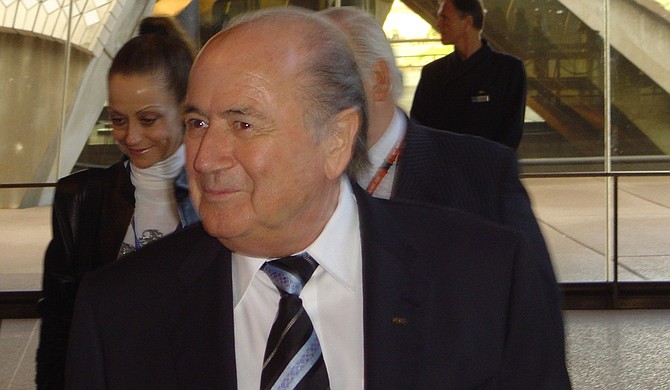Life has been pretty ugly for "the beautiful game" over the past couple of weeks. After years—more like decades—of allegations of corruption and bribery, both the United States' and Switzerland's investigations of FIFA have put a black eye on soccer, the world's biggest sport.
It took two countries, but finally, Joseph S. "Sepp" Blatter, the president of FIFA for the last 17 years, a man who was more Teflon than John Gotti, finally went down like the former mobster.
The Swiss-born Blatter began working for FIFA in 1975 as a technical director, a position he held until 1981, when he became the general secretary. Blatter held that position until 1998, serving as the right-hand man of then-President Joao Havelange.
When Havelange decided to retire, Blatter was a surprise choice to replace him as FIFA president at the 1998 FIFA Congress, when he defeated Lennart Johansson of Sweden. Rumors of bribery followed almost immediately, but officials could find no solid evidence.
Blatter survived the fall of the Swiss company International Sports and Leisure in 2001. A joint Swiss and FIFA in-house investigation found millions of kickbacks to executives, but once again, nothing linked the corruption to Blatter himself as he neared the end of his first term as president.
Right before the next FIFA Congress in 2002, Blatter faced General Secretary Michel Zen-Ruffinen's accusations of financial mismanagement, conflicts of interest and abuse of power, to the Swiss authorities. Blatter seemingly covered up any wrongdoing, and Zen-Ruffinen was forced out, having failed to dislodge Blatter from power.
Even with charges of corruption, bribery and other misdeeds, Blatter still won re-election as FIFA president in 2002. This time, he withstood a challenge from Issa Hayatou of African football.
Scandals continued to follow FIFA and Blatter after the 2002 election, but nothing stuck. The FIFA president stayed in power as he prepared for a third term. In 2007, Blatter won the re-election unopposed.
How he was able to build power is a study in abusing a true democracy. In FIFA, every country gets the same amount of power: one vote. So, the weight of the U.S. vote is the same as Guam or Guyana. Blatter was a master at supporting those smaller countries, and in turn, the story goes, those smaller countries made it well known that their votes were for sale when it was time to award sites for major tournaments.
Blatter didn't mind paying the price and always returned loyalty. He made sure that Africa got to host its first World Cup when South Africa hosted in 2010 and made sure that the African and Asian soccer confederations were taken care of both financially and in the boardroom.
As Blatter consolidated power, his time approached the beginning of the end. His fall from power started in 2010, when Russia was awarded the 2018 World Cup and Qatar got the 2022 World Cup.
The awarding of two World Cups was unprecedented and set the stage for massive corruption and bribery investigations. After FIFA gave Russia and Qatar the World Cups, it launched an investigation into the process.
Blatter and other top FIFA officials took another hit when American Michael Garcia, the FIFA ethics investigator, quit over how officials told him to conduct his report into the bidding of the 2018 and 2022 World Cup. This and other Blatter missteps, like saying racism could be ended with handshakes, women's soccer players should wear tighter uniforms to boost ratings, and gay fans at the Qatar World Cup shouldn't engage in sexual activity at the event, were starting to finally catch up with him.
Still, the 2011 FIFA Congress elected Blatter to a fourth term against his main rival, Mohammed bin Hammam, and Blatter always stayed one step ahead of scandals that rocked the world of soccer.
Finally, at the end of May 2015, U.S. officials used a Switzerland extradition treaty to arrest 14 high-ranking FIFA officials. The fruit of a four-year FBI investigation finally came down on those who made years of shady deals.
However, Blatter was still reelected to a fifth term as FIFA president just days after the arrests. His challenger, Prince Ali Bin Al-Hussein, dropped out after the first round of voting.
As American and Swiss investigators kept investigating, it finally became clear to Blatter that this was one scandal he would not be able to outrun. After 17 years as president and 40 years working with in FIFA, Blatter resigned on Tuesday, June 2, 2015.
Even if he didn't have a hand in the scandals, it is clear that he looked the other way with each one. FIFA now has to find a new president that, like Blatter, keeps developing a voice for smaller nations at the table but is more transparent than Blatter was during his presidency.
Like any Teflon Don, Blatter finally ran into a scandal that stuck.



Comments
Use the comment form below to begin a discussion about this content.